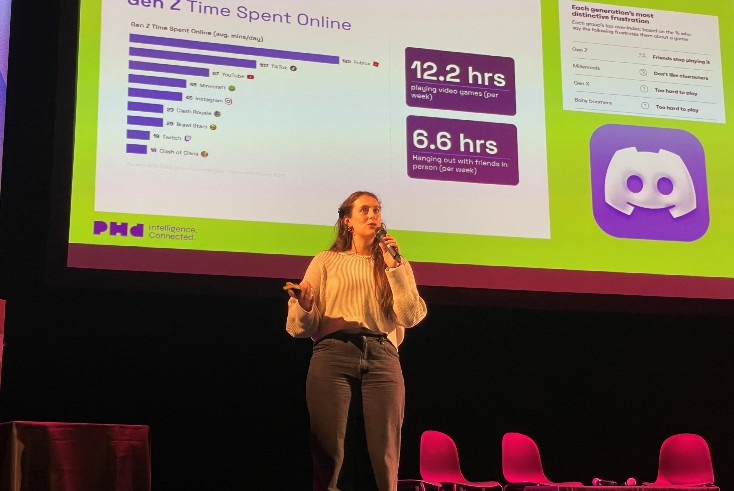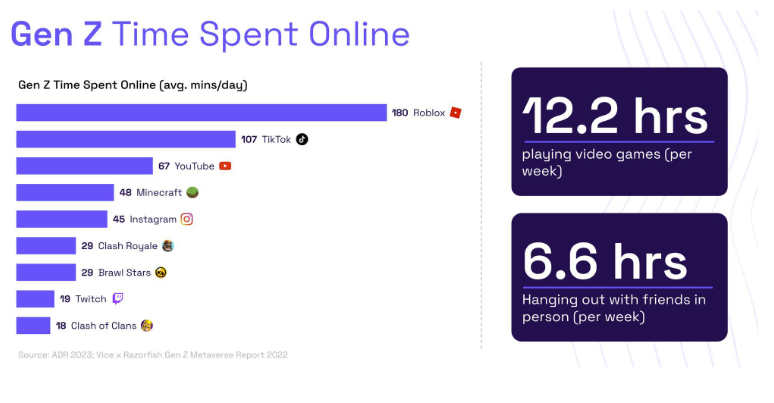Gen Z aren’t just teens — they’re customers and big gamers

The Future of Media Manchester
“Gaming should not be an innovation budget. Maybe it should have been an innovation budget five years ago, but now it should be a part of your current and core media mix.”
Tess Gullis, gaming business director at Omnicom Media Group agency PHD Manchester, implored attendees at The Future of Media Manchester to reconsider their understanding of younger audiences when looking at gaming’s importance on the media plan.
“If you’re to look at the amount of time Gen Z spends online — we invest millions into TikTok, but actually they’re spending more time on places like Roblox,” Gullis said.
“When we look at our media plans, this isn’t being reflected in the investment.”

Gen Z aren’t teenagers any more
Gullis partially attributed the lack of urgency to invest in gaming to a misunderstanding of younger audiences. She joked that pandemic lockdowns made time stop “working properly” for professionals in the industry.
“It’s actually affecting our planning, particularly when it comes to audiences,” she said. “Who are those audiences? Well, you’ve got Gen Z — teenagers — and Gen Alpha, who are babies.
“[But] actually they’re not. That was from five years ago. Gen Z are all young adults and Gen Alpha are, scarily, turning 15 this year.”
Gullis shared that more than half (55%) of Gen Z has already left home, with much of the cohort now earning their an income.
“They’re immediate customers,” she said. “But typically, when we’re talking in meetings, when we’re doing brainstorms, they’re still treated like teenagers. But they’re in jobs, they’re in the workplace, they’re 27-year-olds.”
Roblox moves to create a walled garden as it leans into ad strategy
Meanwhile, Gen Alpha should be an “immediate concern”, given this group is estimated to be the largest-ever generation with 2.2bn individuals globally.
Notably, according to Gullis, more than half (55%) are already creating videos to post online, are on average spending just under five hours per day on screens and are more likely to be influenced by content creators than their own families when it comes to making purchasing decisions.
“They’re already creating a very unique online identity for themselves,” Gullis added.
‘Don’t get left behind’
With this in mind, Gullis suggested gaming strategies should be of a more immediate concern to advertisers, especially as the channel has become ingrained in under-30s’ social lives.
“I think some people still see gaming as a very solitary activity — something you do at home alone — but the reality is it’s part the social experience,” said Gullis, adding that many younger players will start and stop playing games depending on whether their friends are also using them.
This is true even of Gen Alpha, around a quarter of whom (22%) reportedly play video games for 12 or more hours in a given week. Much of this is due to co-gaming — playing games, especially on popular platform Roblox, with their parents, who are themselves gamers.
Given the prominence of gaming in their lives, Gullis warned against treating gaming as an innovation item in the budget. In fact, the agency model has previously been criticised as being poorly suited to meet the needs of gaming advertising.
Gullis concluded: “It’s really important brands don’t get left behind.”
Podcast: Are agencies fit for purpose when it comes to gaming advertising?




